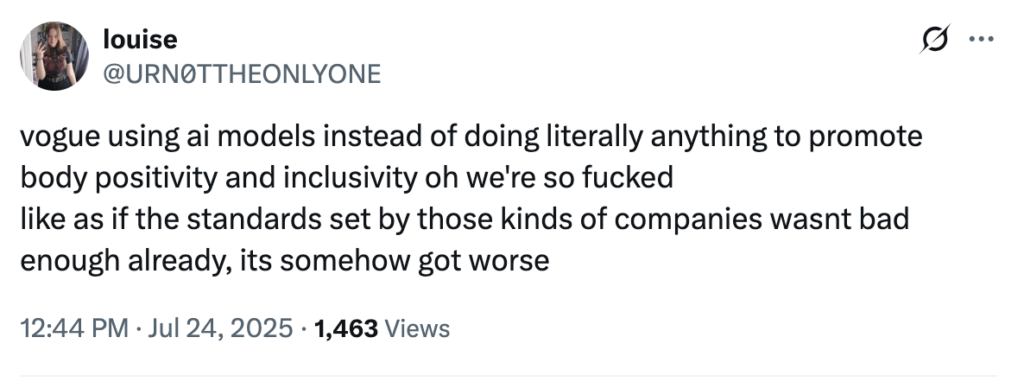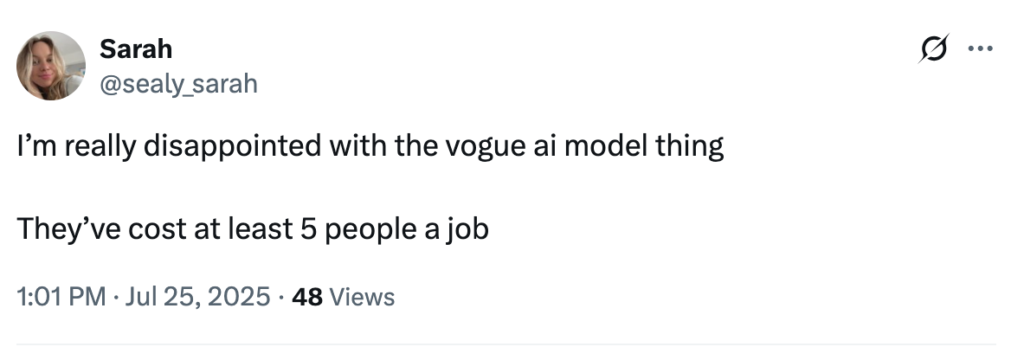Vogue’s AI Model Is A Sign Of The Times, And It’s Not Good For Black Women

Vogue is receiving backlash for the use of an AI-generated model in its August issue. The double-page Guess advertisement, created by AI marketing agency Seraphinne Vallora, features a blonde model wearing two different outfits.
Seraphinne Vallora specializes in “editorial-level AI-driven marketing campaigns and cinematic videos.” The agency has previously worked on editorial shoots featured in Harper’s Bazaar and Elle. Seraphinne Vallora told the BBC that it created 10 draft models for Guess cofounder Paul Marciano, who ultimately selected one brunette and one blonde.
When asked about the choice of race for the model, the agency put the blame on its Instagram followers. “We’ve posted AI images of women with different skin tones, but people do not respond to them,” cofounder Valentina Gonzales told the outlet, “we don’t get any traction or likes.”
Vogue’s AI Model Sparks Backlash
Readers of the fashion magazine have spoken out against Vogue using AI.



AI-generated diversity?
The incident adds to growing concerns about how AI may be reinforcing racial bias in fashion. The industry has long struggled with diversity, particularly when it comes to Black representation. CUNY Academic Works found that Black models make up for six percent of models used on the runway during the fashion month calendar. A survey conducted by The Fashion Spot in 2016 found that 78.2% of all the models featured in spring 2016’s fashion adverts were white, while only 8.3% were Black.
Meanwhile, the use of virtual and AI-generated models, particularly Black models, has become increasingly popular in the past decade. Virtual influencer and model Shudu has over 237,000 followers on Instagram and has had partnerships with brands including Balmain, Louis Vuitton, and Furla, as reported by The Conversation.
Shudu was created by a white man, Cameron James-Wilson, using an online 3D drawing program. ‘I wanted to create a really strong and powerful image that celebrated a beauty I don’t see represented in media often enough,’ he told Elle Magazine.
While it’s true that Black models are underrepresented, creating AI models does not address the systemic racism within the industry. Instead of providing opportunities to real Black models, especially dark-skinned women, it allows brands to profit from Black aesthetics without addressing racism or inequality behind the scenes.
Real Models, Real Racism
Black models have long spoken out about discrimination in the industry. Leomie Anderson, Naomi Campbell, and Jordan Dunn have openly spoken about the racism they’ve experienced on sets, from stylists and makeup artists untrained to work with Black hair and skin, to being tokenised or excluded altogether.
Although there have been improvements in diversity over the past 15 years, recent economic challenges and growing backlash against DEI efforts have reversed much of that progress. Vogue Business even called 2023 “the year fashion backtracked on diversity.”
Opportunities for dark-skinned Black models are especially sparse. “There might be a ginger girl and white girl, but sometimes there’s only a light-skinned or mixed-race girl that’s meant to represent the black side,” Leomie Anderson said in an interview with Dazed. In a world where dark-skinned models are still struggling to be seen, AI models make visibility for Black women even harder.
Image: Seraphinne Vallora



